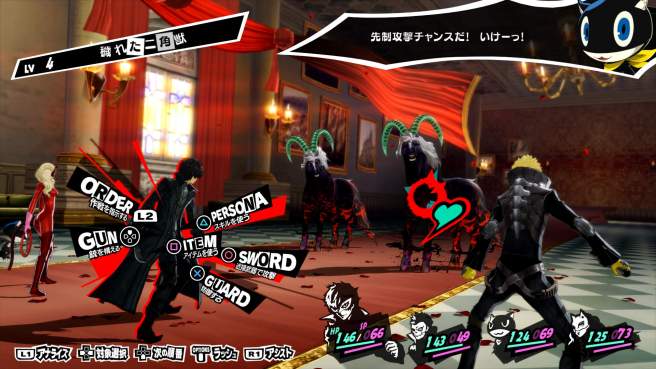I was done with Persona 5, a game which I’ve enjoyed quite a lot. I did, however, have many issues with the game.

Shin Megami Tensi: Persona 5 has you play as a high school student who all of a sudden is burdened with the task of stopping evil adults around him, starting with the abusive teacher at school, a renowned artist who’s also a plagiarist, an extortionist gang leader , an abusive CEO of a fast food chain, a prosecutor who doesn’t care about justice so long as the case is closed and a power hungry politician. The gameplay portion is divided into two main parts; the main quest, level grinding in dungeons and beating bosses and social links.
You obtain personas; powerful beings that aid you in battles. There’s a category for each persona. Social links represent those categories. Should you wish to level up a persona of a certain category, you will have to maximise the relationship with a character of the same category. The characters who hold persona categories and the bonds you establish are varied. There are friendships as well as romance.
Compulsive Heterosexuality
As previously mentioned, in order for you to maximize a persona, you need to maximise the relationship you have with the character of that persona’s category. You can’t choose to be friends or partners with anyone you like. The game makes every woman identifying character a potential love interest. The game also doesn’t include queer characters as no character expresses romantic or sexual interest in characters of the same gender. The game has binary characters who are men and women and assumes both are heterosexual. There were constant reminders of the characters compulsive heterosexuality as boys commenting on the girls’ tight outfits and swimsuits, sneaking look at the girls’ bodies when their clothes are soaked twice and a character assuming your sexuality based on your gender identity. The game also has an event where one of the characters who identifies as a man responds to a compliment by the main character by saying he “would rather hear that from a lady.”
Adult-minor relationships but no queer representation
For a game that has characters fight evil, minor adult relationships are sure rampant. Odd thing is the first villain in the game is a teacher tw: sexual abuse who physically and sexually abuses students. The teacher physically and verbally abuses students and sexually harasses female students. Persona 5 lets you date not one but four adults; A teacher, yes, as if it’s any different, a doctor, a journalist and a fortune teller. Though age of consent in Japan is twenty, the game thinks minors can consent to relationships with adults five years and more their senior. Not to mention one of the adults gives unlicensed substances to the main character. Including four adult women as romance option but not one same gender speaks volumes of the game’s homophobia.
Women robbed of their agency
Persona 5 may feature “achieving women”; a public prosecutor who often talks about the challenges she faces in a male dominant profession, a scientist, a hacker, a doctor, a reporter and four playable characters, it still robs them off their agency, has them in situations where they have no control over matters as basic as marital status. Haru, one of the female playable characters, is forcibly engaged to a rich man to achieve financial gains. Though you do beat the “cognitive” version of the rich and abusive fiance, Haru is still engaged to him in reality. A seventeen year old high school student is forcibly engaged to a an abusive man who expressed desire to demean and mistreat her multiple times yet even after that the game has them both together in the car during a major event. Another part where the game denies women self agency and autonomy is when one of the boys asks the girls to change into swimsuits so that they seduce an older man and obtain information. The girls, not protesting the plan, agree to it for the “great good” of course.
White Superiority Complex
It’s no secret that the Japanese video game and anime industry churn creations of people who suffer from such complex. Persona 5 is no exception to that. Often times we hear about discrimination against people who are half Japanese. But being “half ” alone isn’t a reason to be discriminated against. You have to be half black or brown. Half whites on the other hand are idolised. The game features yet another example to this racist idolization. Ann, a character who’s half British, is often praised for her “exquisite” beauty and “different” features. Whenever they need a woman to seduce a man in the game, again robbing agency of women, the groups leaves the task to Ann. A missed opportunity to make the white dubbed cast racially diverse.
Culturally Insensitive
The game does a common mistake which is including sacred and revered gods and symbols from other cultures as enemies. P5 has a lot of Hindu deities and much has been said about portraying gods worshipped by millions as enemies in video games and entertainment industry. Having enemies based on gods beside enemies as “ambassador of filth” a demon sitting on a toilet seat only makes matters worse. How about you don’t include gods at all?
While I appreciate the effort in writing a story of which consumers can connect with, I especially appreciate the fact that the game dedicated an arc to address worker struggles and portray an abusive CEO as a villain, I cannot excuse Atlus for the said issues. It’s very likely that I will not support them in the future should they not sincerely commit to diversity and avoid including problematic content.